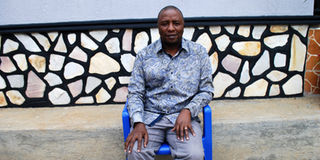Cancers need to be diagnosed and treated early - Dr Atwiine

Dr Barnabas Atwiine, the head of the cancer unit of Mbarara Regional Referral Hospital. PHOTO | ALFRED TUMUSHABE
Alfred Tumushabe interviewed Dr Barnabas Atwiine, the head of the cancer unit of Mbarara Regional Referral Hospital, on prevention and treatment of cancers.
What is cancer and how does it come about?
Cancer results from body cells growing abnormally. Cells are building blocks of the body which keep dividing and increasing in number in a normal process called cell division. When a mistake happens during cell division, cancer cells are formed, which in turn keep dividing and increasing in number.
Any part of the body can develop cancer; hence there are as many types of cancer as there are the different body parts. Each cancer is different from others in as how it develops, the symptoms it causes, how it is treated and how it responds to treatment.
What are the common types of cancers that you deal with at Mbarara Regional Referral Hospital?
Among women, cancer of the cervix is the commonest here, diagnosed in about 100 women per year. Breast cancer is diagnosed in about 80 women per year. Among men, prostate cancer is the commonest, diagnosed in about 100 men per year. The other common cancers in both men and women include those of the esophagus, colon and stomach.
In children, leukemia (cancer of the blood) is the commonest. Of the about 150 children diagnosed with cancer per year, nearly 40 have leukemia. The other common cancers in children include cancers of lymphnodes, kidneys and muscles. Altogether, close to 1,000 people are diagnosed with cancer here every year.
What causes these cancers?
Most cancers develop by themselves, without anything causing them. However, cervical cancer is associated with a virus called human papilloma virus (HPV) which is sexually transmitted. The risk of prostate cancer increases with age and is commonest after the age of 40 years. Cancers in children generally have no risk factors and can develop in any child anywhere at any age and time.
How can cancers be prevented?
General healthy lifestyles such as a balanced diet, exercises, avoiding smoking and alcohol reduce the risk of most cancers. Safer sexual practices and human papilloma vaccine prevent cervical cancer.
Cancer of the cervix and prostate show certain warning signs before they develop and can be screened for every three to five years in women of child-bearing age and men above 40 years, respectively, and prevented from developing.
Most other cancers have no screening methods and need to be diagnosed and treated early and adequately.
How often do you do cancer screening in this unit?
Cancer of the cervix is screened every day. We screen about 1,300 women per year. All the other cancers are screened on Wednesday of every week.

Women line up for free cervical cancer screening at Biharwe Health Centre III in Mbarara on April 29, 2013. PHOTO | FILE
Which symptoms do people with cancer develop and how can they know they have cancer?
Cancers cause different symptoms depending on the type and the part of the body they have developed from. Generally, most cancers present with swellings of different parts of the body. Consequently, any swelling on any part of the body should be tested for cancer. Blood cancer (leukemia) presents with prolonged fevers and lack of blood. Generally, any patient with prolonged symptoms that do not respond to usual treatment should be suspected with cancer and referred to us.
What do you do for cancer patients when they reach here?
We remove a piece of the swelling and test it for cancer. Depending on the type the patient has, we either operate the patient and cut the cancer out or give them chemotherapy. Patients who require radiotherapy are all referred to Uganda Cancer Institute where the only radiation machine in the country is.
How much does it cost to treat patients with cancer and is it free of charge?
Patients get free treatment here. The hospital has a laboratory that tests most cancer samples for free. Uganda Cancer Institute sends us more than 90 per cent of all the medicines we need. Our partners, Massachusetts General Hospital in the United States, provide salaries for extra health workers to add to those posted by government.
Apart from a few additional things we ask patients to do and buy for themselves, all of them receive free cancer treatment.
What more do you think needs to be done to help the dire situation of cancer in Uganda?
Awareness about cancer needs to be increased; it’s screening, symptoms and signs and the availability of its treatment. Health workers need to be re-trained in cancer recognition so they can detect patients early and refer them for diagnosis and treatment. More resources need to be devoted to cancer and its treatment should be decentralised nearer to the people as this is only the second cancer treatment facility in Uganda, after Uganda Cancer Institute. More specialists need to be trained in cancer care including doctors, nurses, pharmacists, pathologists, and many others.
What is your last word?
Cancer is not a curse or punishment or witchcraft. If anyone suspects they have cancer, from what I have explained above, they should come straight to the unit here. Cancer is not a death sentence and like other diseases, can be cured if recognised and treated early.
Challenges in Cancer treatment
Low awareness about cancer among health workers and the general public leads to patients presenting with advanced disease with less chances of cure. The patients are many and overwhelm the few health workers and facilities for cancer treatment. Our unit lacks many facilities to ensure safe delivery of highly active cancer medicines, so patients suffer a lot of side effects. A lot of people still believe cancer is caused by witchcraft, so they abandon treatment and go for herbal medicine and prayers.




